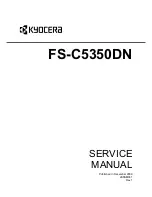
11-27
Appendix > Glossary
DHCP (Dynamic Host Configuration Protocol)
Dynamic Host Configuration Protocol (DHCP) that automatically resolves IP addresses, subnet masks, and gateway
addresses on a TCP/IP network. DHCP minimizes the load of network management employing a large number of client
computers because it relieves individual clients including printers from the IP address being assigned.
DHCP (IPv6)
DHCP (IPv6) is the next-generation of the Internet's Dynamic Host Configuration Protocol and supports IPv6. It extends
the BOOTP startup protocol that defines the protocols used for transferring configuration information to hosts on the
network. DHCP (IPv6) permits the DHCP server to use its expanded functionality to send configuration parameters to an
IPv6 node. Because the network addresses that can be used are allocated automatically, the IPv6 node management
workload is reduced in systems where the administrator has to exercise close control over IP address allocation.
dpi (dots per inch)
A unit for resolution, representing the number of dots printed per inch (25.4 mm).
EcoPrint Mode
A printing mode that helps save toner. Copies made in this mode are thus lighter than normal.
Emulation
The function to interpret and execute other printers' page description languages. The machine emulates operation of
PCL6, KPDL3 (PostScript 3 compatible).
Enhanced WSD
Proprietary web services.
FTP (File Transfer Protocol)
A protocol to transfer files on the TCP/IP network, whether the Internet or an intranet. Along with HTTP and SMTP/POP,
FTP is now frequently used on the Internet.
Grayscale
A computer color expression. Displayed images of this sort are typically composed of shades of gray, varying from black
at the weakest intensity to white at the strongest, without any other colors. Gray levels are displayed in numerical levels:
that is, white and black only for 1 bit; 256 gray levels (including white and black) for 8 bits; and 65,536 gray levels for 16
bits.
Help
A ? (Help) key is provided on this machine's operation panel. If you are unsure of how to operate the machine, would like
more information on its functions or are having problems getting the machine to work properly, press the ? (Help) key to
view a detailed explanation on the touch panel.
IP Address
An Internet protocol address is a unique number that represents a specific computer or related device on the network.
The format of an IP address is four sets of numbers separated by dots, e.g. 192.168.110.171. Each number should be
between 0 and 255.















































